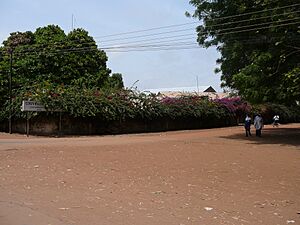University of the Gambia facts for kids
|
Motto in English
|
Knowledge Truth Development |
|---|---|
| Type | Public |
| Established | 1999 |
| Chancellor | President Adama Barrow |
|
Academic staff
|
313 (2017) |
| Students | 6000 approx (in September 2017) |
| Location | , |
| Campus | Kal Jawara Memorial Block (MDI), Kanifing South, Sere Kunda) Royal Victoria Teaching Hospital (Banjul) Gambia College (Brikama) |
| Affiliations | St. Mary's College of Maryland Alliance française Saint Mary's University (Halifax) |
The University of the Gambia (UTG) is a public university. It is a place for higher education in Kanifing, The Gambia. Its motto is Knowledge Truth Development. This means the university focuses on learning, finding facts, and helping the country grow.
Contents
History of the University
The University of the Gambia started in 1998. It was first located in Kotu-Kanifing, a part of Sere Kunda. The university began offering classes in March 1999. This happened after the Gambian National Assembly passed a law. About 300 students joined in 1999.
By 2002, the university had 44 teachers. By 2006, almost 2,000 students were attending. The number of students and teachers kept growing. The Gambian government has plans for a new campus. It will be located in Faraba Banta.
Helping Public Health
The university also helps improve public health. In October 2012, it started two master's degree programs. These programs focus on public health. They were created with the University of Illinois at Springfield and the University of Iowa.
These programs help address health concerns in The Gambia. For example, The Gambia was declared free of polio in 2004. This success came from strong efforts and high rates of polio vaccination. The university's programs continue to support such health improvements.
What Can You Study?
The University of the Gambia has many different schools. These schools offer various subjects for students to learn.
University Schools
Here are some of the schools at UTG:
- School of Agriculture and Environment Sciences
- School of Arts and Sciences
- School of Business and Public Administration
- School of Education
- Faculty of Law
- School of Journalism and Digital Media
- School of Engineering and Architecture
- School of Medicine and Allied Health Sciences
- School of Information Technology and Communications
- School of Graduate Studies and Research
- UTG Digital Campus
- UTG North Bank Campus
Degrees You Can Earn
Students at UTG can earn different types of degrees. These include Bachelor's, Master's, and PhD degrees.
- Bachelor's Degrees: These are usually the first degrees students earn. They include subjects like Education, Development Studies, Law, Medicine, Accounting, Biology, Computer Science, Economics, Nursing, Physics, and Public Health.
- Master's Degrees: These are advanced degrees. Students can study subjects like African History, French, Law, Climate Change, Public Health, Mathematics, and International Relations.
- PhD Degrees: This is the highest degree you can earn. At UTG, you can get a PhD in Public Administration.
University Teachers
Many skilled teachers and leaders work at the University of the Gambia. They help students learn and grow.
Some of the people who have taught or worked there include:
- Prof. Herbert Robinson, the current Vice Chancellor.
- Prof. Faqir. Muhammad Anjum, a former Vice Chancellor.
- Dr. Momodou Lamin Tarro, the Registrar.
- Dr. Habibatou Drammeh, Director of Student Affairs.
- Mr. Mbakeh Camara, Director of International Relations.
- Dr. Lamin B. Ceesay, Acting Head of the School of Business & Public Administration.
- Dr. Sidat Yaffa, Director of WASCAL.
- Alhaji Alieu Ebrima Cham Joof, a history lecturer.
- Musu Bakoto Sawo, a lecturer in international human rights law. She won the "2020 African of the Year Award."
- Bukhari M.S. Sillah, an economics lecturer.
- Saja Taal, a political science lecturer.
See also
- List of universities in the Gambia
 | Anna J. Cooper |
 | Mary McLeod Bethune |
 | Lillie Mae Bradford |


